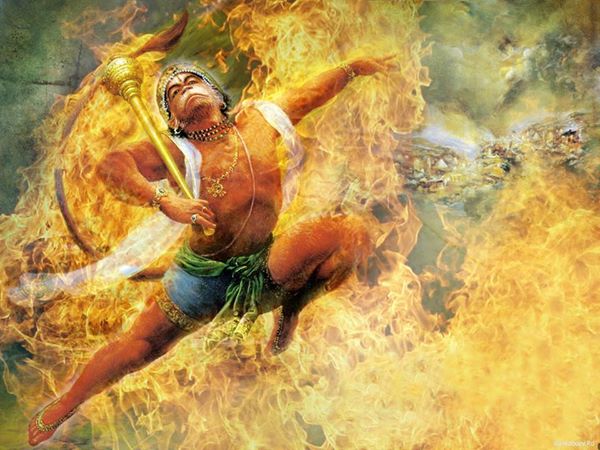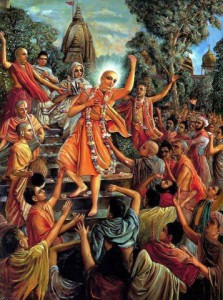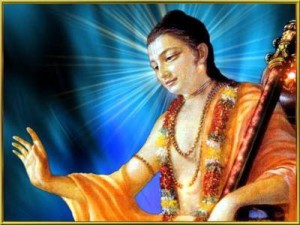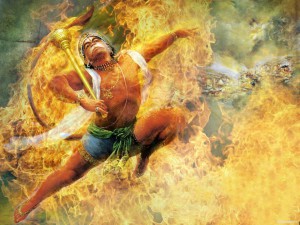The Test of Hanuman’s Devotion
Once, Narada Muni, the great sage and pure devotee, visited Hanuman. In a playful manner, he challenged Hanuman’s devotion, saying, “You are not a true devotee!”
Hanuman, taken aback, asked, “Why do you say that, Naradaji?”
Narada Muni replied, “According to Vedic injunctions, there are six types of aggressors who incur no sin when killed, and one of them is someone who sets fire to another’s house. During your search for Mother Sita in Lanka, you set fire to the houses of the Rakshasas. How can you be called a devotee after committing such an act?”
Hanuman’s Defense
Understanding the underlying intent of Narada’s question, Hanuman smiled and said, “Naradaji, one of the duties of a Rama bhakta (devotee of Rama) is to perform the final rites for unclaimed dead bodies, ensuring they attain a better life in their next birth. When I went to Lanka, I observed that in those grand palaces, no one chanted the names of the Lord. According to the shastras, those who do not chant the holy names are considered as good as dead. Therefore, I set fire to those houses to release their inhabitants from their miserable existence.”
Hanuman continued, “There was one house that I left untouched, the house of Vibhishana. From there, I could hear the chanting of Lord Rama’s names.”
Hanuman’s Additional Measure
Hanuman added, “I also made a loud roar that frightened the Rakshasas. This caused many pregnant Rakshasis to abort their fetuses, ensuring that future generations of Rakshasas, who could cause more trouble, were prevented from being born.”
Narada Muni was pleased with Hanuman’s explanation and hugged him, praising his unparalleled devotion to Lord Rama.
Moral of the Story
This conversation highlights the importance of chanting the names of the Lord. Without chanting, we are like living dead. This is beautifully explained in Srimad Bhagavatam (10.38.12), where Akrura, traveling from Mathura to Vrindavan to bring Krishna and Balarama to Mathura, speaks:
Copy codeyasyaakhilaameeva habhih sumangalaih
vaaco vimishraa guna-karma-janmabhih
praananti shumbanti punanti vai jagad
yaas tad-viraktaah shava-shobhanaa mataah
“All sins are destroyed and all good fortune is created by the Supreme Lord’s qualities, activities, and appearances, and words that describe these three things animate, beautify, and purify the world. On the other hand, words bereft of His glories are like the decorations on a corpse.”
Unique Positive Results of Chanting the Lord’s Glories
- Akhila ameeva habhih: Destroys all the sins of the entire world.
- Sumangalaih: Creates auspiciousness and good fortune.
- Praananti: Animates or brings life to otherwise dead beings.
- Shumbanti: Beautifies the entire world.
- Punanti: Purifies the entire world.
Words devoid of the Lord’s glories are considered like decorations on a dead body. Those who are attracted to such words are as good as dead bodies.
Conclusion
The causeless mercy of Srila Prabhupada and our spiritual masters has granted us the greatest boon of devotional service unto the Lord. Let us sincerely follow their instructions and rejuvenate our spiritual lives by constantly engaging in the chanting of the holy names and the glories of the Lord.
Hare Krishna, Hare Krishna, Krishna Krishna, Hare Hare Hare Rama, Hare Rama, Rama Rama, Hare Hare.
PS: I humbly request all devotees to share this moral and instructive story so that everyone can benefit from hearing about Krishna and His dear devotees.



